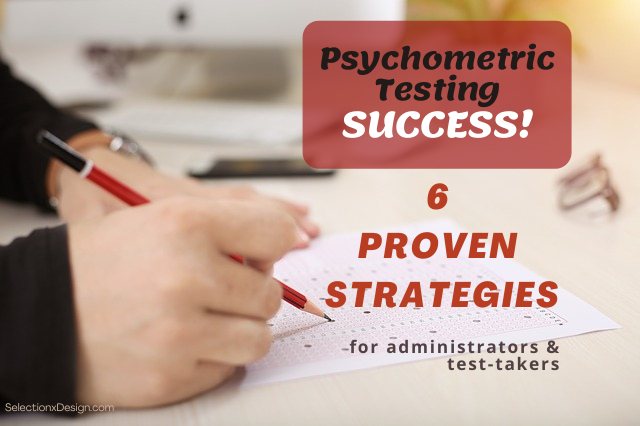Successful psychometric testing can mean different things to the test-taker and to the administrator. If you’re completing an ability or aptitude test, the goal may be to achieve results that will pass a cut-off point, or allow progression to the next level in a recruitment campaign. As a test administrator, you may consider testing as ideal when measurement is fair, reliable and valid. Whatever your role during psychometric testing, the 6 strategies below can help improve performance and provide accurate results.
-
Prepare for psychometric testing: Be ready.
How do you prepare for a psychometric test? As you approach testing time, prepare yourself physically, mentally and emotionally. Each individual has unique conditions for their optimal performance. Consider your past experiences with assessments, and then decide what works best for you. You may wish to complete the test at a certain time of the day, when you are alert and focused. It can help to ensure you have had optimal sleep, exercise and nutrition as you prepare for psychometric testing. You might consider persons you will turn to for advice or support, or even those you might avoid, as you approach the time of your test.
Invest the effort in getting yourself ready to do your best. As our trainer Dr Conor Mc Guckin often reminds SxD course participants, if you fail to prepare, prepare to fail!
-
Read through instructions very carefully.
Psychometric tests differ in the way questions are presented, timed, and progressed through. Answer formats vary, and the way that scores are compiled differs across assessments. Information on how to proceed through a test is provided in the initial instructions. Directions are specifically written for each test, and carefully trialled to maximize clarity. For example, you may be told whether you may skip items, or go back to a previous question later. Importantly, is it helpful to guess at answers? Your test-taking strategy should be tailored according to the psychometric testing details provided before you start.
-
Work through the practice items.
Before beginning a test, complete each practice item carefully. Be sure that it is clear how the correct answer was determined. If you are taking a test, never skip the practice items. Even if the psychometric test questions and answers seem simple, you’ll become familiar with when and how to correctly indicate responses.
If you’re administering a test, be sure to read through the practice items and be able to guide your audience through correct and incorrect response choices. For proctored or face-to-face psychometric testing, this may be the time when questions come up.
You can find out more about the links between effective administration and the accuracy of test results in our blog “How to Get Results You Can Trust with Psychometric Assessments“.
-
Optimise your testing environment.
Take the time to set up your environment so you’ll be able to focus and work efficiently. A quiet place to complete the test is a must. Turn off or remove any possible distractions, including your phone. Ensure any resources that you may need during the test are set up and readily available. Depending on the assessment, this may include paper for rough work, pencils or pens, and a calculator. If completing a psychometric test online, check internet requirements, and make sure you have what is needed. Note: it is very helpful to complete any practice work or items within the same environment that you will actually use for testing to help identify and address any potential issues.
-
Seek additional practice and professional psychometric testing advice.
If you are interested in building your psychometric test-taking skills, completing further practice tests or seeking guidance from psychometrics professionals is a great idea.
Your own test-taking strategies develop further each time you complete an assessment. For example, additional testing experience will help you decide how to approach different kinds of questions. You’ll also develop your own sense of pace and timing for working through a test.
It can be helpful to talk to persons specialised in psychometrics about how test questions and possible answers may lead or mislead you, or about ways to approach different kinds of questions. You can find introductory resources related to test practice on the BPS website.
SxD offers one-to-one consultation to clients as they prepare for psychometric testing, as well as training through our test preparation course “Succeeding with Psychometrics.” Please contact us to find out more.
-
Take note of your psychometric testing experiences.
After you have completed a test, record your thoughts on what worked and what didn’t. Analyse your test-taking strategy. Is there something you would do differently the next time? What advice would you give yourself for future psychometric testing?
Successful test-taking develops with learning and practice. Remember this in reflecting on your own psychometric testing experiences, or in communicating with your clients about their encounters with assessments.
Happy Testing!
Would you like to learn to administer or interpret psychometric tests? Join us for
SxD’s upcoming Test User training in Occupational, Forensic or 16pf Specialization.


